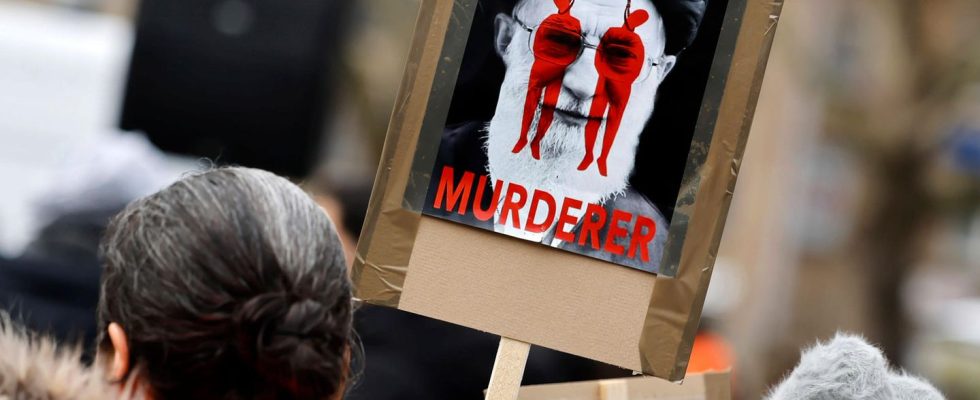execution
Because of “armed rebellion”: Two men hanged in Iran after attack on pilgrimage site
Protest action against the regime in Iran in February in Cologne. Amnesty International registered 582 executions in the Islamic Republic last year alone
© Christoph Hardt / Imago Images
The judiciary in Iran has again executed two men. The Afghans were publicly hanged in the city of Shiraz.
Nine months after a deadly attack on a Shiite pilgrimage site in Two suspected accomplices of the perpetrator have been publicly executed in Iran. The two Afghans, Mohammad Rames Raschidi and Naim Hashem Ghotali, were hanged near the mausoleum of Shah Cheragh in Shiraz early on Saturday morning, the official Irna news agency reported. They had previously been sentenced to death in a controversial trial for “corruption on earth” and “armed rebellion”.
The Oslo-based human rights organization IHRNGO spoke of an unfair trial and reported that the convicts’ confessions were obtained under torture. Amnesty International wrote on Twitter that the public execution shows once again Iran’s increasing use of the death penalty “as a means of political repression”.
The attack in the capital of Fars province in October 2022 killed 13 people. The attacker was arrested but later died from his injuries. The Sunni terrorist group Islamic State (IS) claimed responsibility for the attack. The Iranian authorities later reported the arrest of dozens of radical Sunnis from Afghanistan, Azerbaijan and Tajikistan, among others.
Public executions are rare in Iran. Most convicts are hanged in prison. Amnesty International registered 582 executions in the Islamic Republic last year alone, the most since 2015. The country is second only to China in the world.
Sunni jihadists attack police station in Iran
Meanwhile, six people were killed in an attack on a police station in the provincial capital Sahedan in the troubled southeastern province of Sistan and Balochistan. All four attackers and two police officers were among the victims, Irna reported, citing the Revolutionary Guards. The Sunni jihadist group Jaish al-Adl (Army of Justice) claimed responsibility for the attack. In a brief statement on her website, she accused members of the police station of being primarily responsible for the “bloody Friday” on September 30 in Sahedan.
At that time, dozens of people were killed in the suppression of protests. According to human rights activists, security forces shot at demonstrators indiscriminately that day. The protests in Sahedan were triggered by reports that a police officer allegedly raped a 15-year-old girl.
“Woman Lead”
Photographer from Iran shows women on motorbikes and singing – and thus sends a clear signal
Sistan and Balochistan borders Pakistan and Afghanistan and is one of the poorest provinces in Iran. Many of the residents belong to the Baloch ethnic minority. They are mostly Sunni Muslims and not Shiites like the majority in Iran, and many of them feel discriminated against.
Jaish al-Adl was founded in 2012 by former members of a radical Sunni movement that led a bloody insurgency in the region until 2010.


